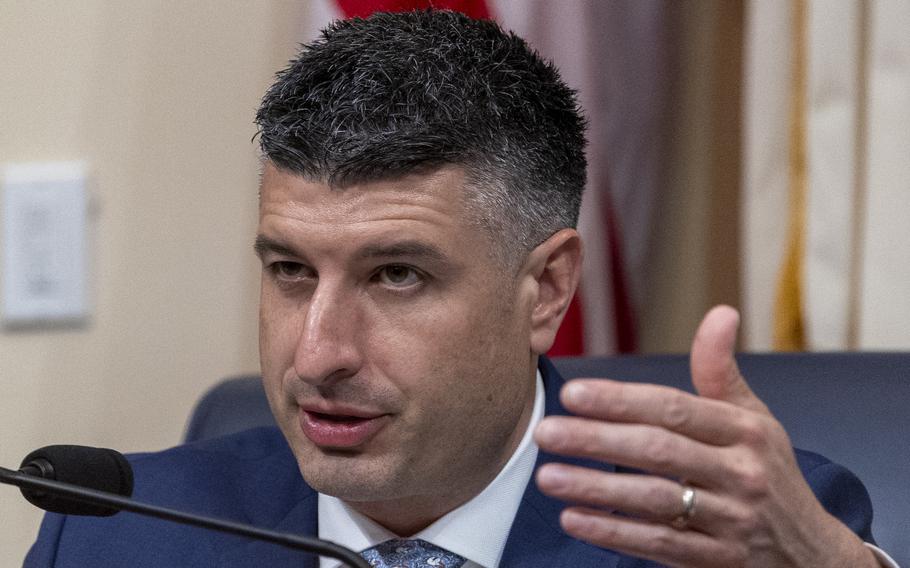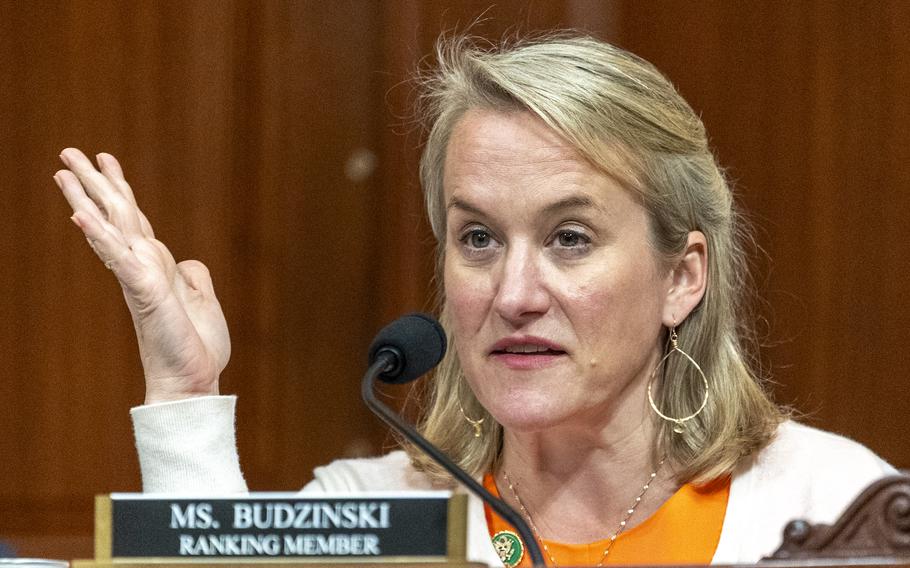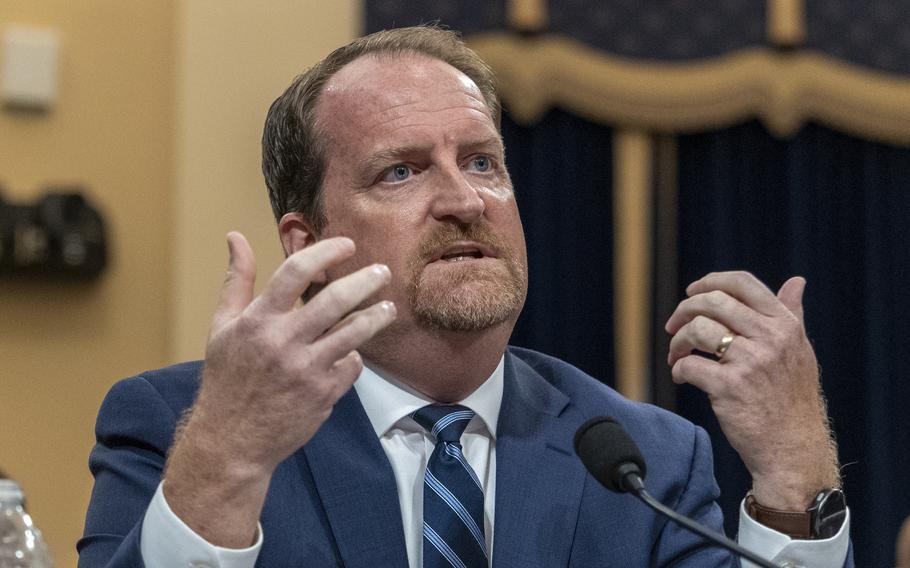
Rep. Tom Barrett, R-Mich., speaks on Monday, May 19, 2025, in Washington at a hearing of the House Veterans Affairs subcommittee on technology modernization. (Eric Kayne/Stars and Stripes)
WASHINGTON — Lawmakers are urging the Department of Veterans Affairs to do a more thorough job of tracking the commercial software licenses it holds — and actually uses — before acquiring additional software products.
The VA pays more than a billion dollars annually for software licenses while failing to end practices that lead to duplication and unused software in its inventory, said Rep. Tom Barrett, R-Mich., at a hearing of the House Veterans Affairs subcommittee on technology modernization.
“VA simply cannot make smart decisions about how many software licenses they buy if they don’t have complete and accurate data,” said Barrett, the subcommittee chairman, at a hearing Monday to examine VA’s oversight of software licenses with major vendors.
“At the most fundamental level, VA needs to understand what licenses they own and whether they are being used,” Barrett said.
Barrett and other Republican lawmakers also cited President Donald Trump’s executive order in March for consolidating government purchases including information technology through the General Services Administration.
But Rep. Nikki Budzinski, D-Ill., said lawmakers must first ensure that centralizing the acquisition of software will not create “downstream disasters” since most VA software is not off-the-shelf technology.
The VA is among about two dozen federal agencies that have not been effectively tracking and managing its software licenses, Budzinski said.

Rep. Nikki Budzinski, D-Ill., speaks on Monday, May 19, 2025, in Washington at a hearing of the House Veterans Affairs subcommittee on technology modernization. (Eric Kayne/Stars and Stripes)
The Federal Information Technology Acquisition Reform Act grants Congress oversight of information technology investments including software, said Carol C. Harris, director of information technology and cybersecurity at the Government Accountability Office.
Software licenses specify the terms by which the federal government may use the software it acquires.
Proper management of software licenses helps to ensure that software is used properly as it is deployed across an enterprise or to individual workstations, Harris said.
In fiscal 2025, the VA plans to spend nearly $985 million on software including commercial software licenses, Harris said.
GAO published a report last year with “alarming findings about the state of software license management at VA,” Barrett said.
“VA could not explain what they paid for specific software products that are bundled into a single licensing agreement because the costs for each individual product are not broken out,” he said.
The VA’s most widely used software vendors with “the highest quantity of licenses installed” in 2022 were Microsoft, HCL Technologies, 1E and Raytheon Technologies, according to the GAO.
Harris discussed two prior GAO reports — conducted in January 2024 and November 2024 — that reviewed how well the VA monitored software licenses.
“VA faced challenges in determining whether it was purchasing too many or too few of these software licenses,” according to findings from January 2024.
The VA paid about $21 billion from fiscal 2022 through 2024 for a range of computer systems and services including software licenses.
Rights to use software are separate from the legal rights to the software itself, which are typically kept by the software manufacturer or a third party.
But VA needs to regularly check software licenses against purchase orders, Harris said. Taking better inventory would enable the agency to identify duplicate and unnecessary licenses.

Jeff VanBemmel, director of end user operations at the VA’s Office of Information and Technology, testifies on Monday, May 19, 2025, in Washington at a hearing of the House Veterans Affairs subcommittee on technology modernization. (Eric Kayne/Stars and Stripes)
The VA has begun to track software license use in real time to determine if licensing already was acquired before placing a new order, said Jeff VanBemmel, director of end user operations at the VA’s Office of Information and Technology.
The VA’s 2025 budget request for the Office of Information and Technology was $6.2 billion, which included $476.7 million for end user software and $17.5 million for software maintenance.
VA hospitals previously acted independently to make their own separate procurements. “We now want to look at this as an enterprise approach,” VanBemmel said. Licenses typically are required whenever commercial software is installed.
The GAO also found restrictive software licensing practices that adversely impacted cloud computing efforts. Restrictive software licenses can lead to extra fees with third-party cloud providers, the GAO said.
Restrictive software licensing practices include vendor processes that may limit, impede or prevent agencies’ efforts to use software in cloud computing.
Harris said VA identified $65 million in savings gained over three years through analysis and closer management of just one of its software licenses.
VanBemmel said acquisitions are now being reviewed at the central level, and the agency is working to make sure it does not have several different commercial software products that “do the exact same thing.”
He said the agency currently has licenses for more than 4,000 commercial software titles. “We’re identifying every accountable person for every software title,” he said.
Barrett said it is necessary to undertake “the hard work’‘ of standardizing software across VA hospitals and clinics.